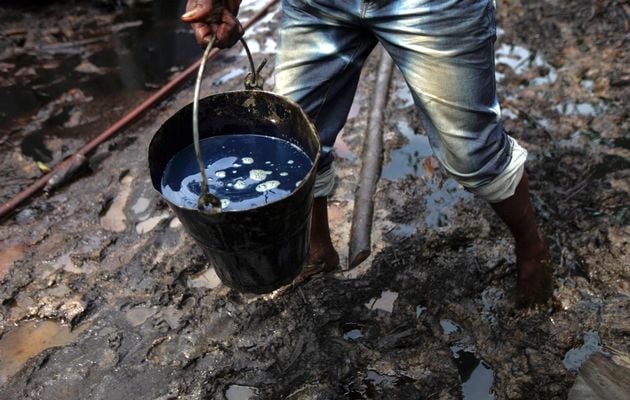Niger Delta
Oil Spills in Niger Delta: Sabotage, not equipment failure – NUPRC

The Nigerian Upstream Petroleum Regulatory Commission (NUPRC) has reported that sabotage was the leading cause of oil spills in the Niger Delta region of Nigeria in 2024.
This was contained in the NUPRC’s annual report, which states that sabotage accounted for over 66 per cent of the total oil spills recorded during the year, with 485 incidents attributed to deliberate damage to oil infrastructure.
NUPRC also revealed that there were 31 accidents in the upstream sector last year, of which 22 fatalities were recorded, while 26,185 Offshore Safety Permits (OSPs) were issued.
It further stated that sabotage accounted for more than two-thirds or over 66 per cent of the total oil spills recorded during the year under review.
According to the commission, “A total of 732 environmental incidents were recorded and categorised by their causes. Of these, 485 incidents were attributed to sabotage, representing approximately 66.2 per cent of all reported spills.
“The data underscored the continuing prevalence of human interference in petroleum infrastructure across oil-producing areas, a development that has significantly hobbled the country’s crude oil output projection for years”, the report explained.
However, apart from sabotage, the NUPRC data stated that 175 cases, or about 23.9 per cent of the incidents, were still under investigation or not yet conclusively determined.
Together, these two classifications alone accounted for about 90 per cent of all the reported environmental spills in 2024.
Other causes of spills were far less prevalent, with equipment failure identified as being responsible for 29 incidents or four per cent, while corrosion accounted for 19 cases or 2.6 per cent, and operational or maintenance errors led to 18 spills or 2.5 per cent of the incidents.
In the same vein, the NUPRC classified three incidents under ‘mystery’, while two cases were caused by natural accidents, and one incident was the result of a blowout. These categories contributed less than 0.5 per cent of all spills combined, underscoring their relative rarity in the current operational context.
The data highlighted the persistent challenges surrounding environmental protection in the Niger Delta, where oil exploration and production have historically been accompanied by varying degrees of ecological degradation.
However, the statistics indicated that human-related actions, both deliberate and accidental, continue to dominate the landscape of environmental incidents in Nigeria’s upstream petroleum sector.
While some causes, such as corrosion and equipment failure, point to ageing infrastructure or technical shortcomings, a higher number of cases were attributed to sabotage, suggesting a specific and enduring trend of direct human interference.
The large number of cases categorised as “not yet determined” also suggested that further investigations were still ongoing into many spills.
It also reflected the difficulty in conclusively identifying causes in certain instances, possibly due to limitations in surveillance, forensic capacity, or on-ground access in high-risk areas.
In comparison, the NUPRC’s environmental management records revealed that a total of 571 oil spill incidents were reported across the region the previous year, 2023, out of which 337 cases, accounting for 59 per cent, were attributed to sabotage, mainly by deliberate damage to oil infrastructure often linked to pipeline vandalism and illegal bunkering.
In 2023, “Not Yet Determined” covered 194 incidents or 33.96 per cent of the total. This group represented cases where investigations into the causes of the spills were still ongoing or inconclusive at the time of reporting.
In the same previous year, technical and operational failures accounted for a much smaller proportion of the total spills.
Equipment failure led to 16 incidents, corrosion accounted for seven, and operational or maintenance errors were behind 11 cases.
A further five incidents were classified under “Mystery”, and only one case resulted from a blowout, meaning a sudden, uncontrolled release of crude oil due to pressure imbalance during drilling or production.
During the 2024 period, the total figure of 732 spills marked a 28 per cent increase in total incidents, although crude production rose due primarily to regulatory actions, surveillance efforts, and community engagement.
Also, the report stressed that there were 31 accidents in the upstream sector last year, of which 22 fatalities were recorded, while 26,185 Offshore Safety Permits (OSPs) were issued.
Out of this number, new permits issued were 6,517, from which 360 persons were one-time flyers and 96 were Very Important Persons (VIPs), while total permit renewals were 19,668.



